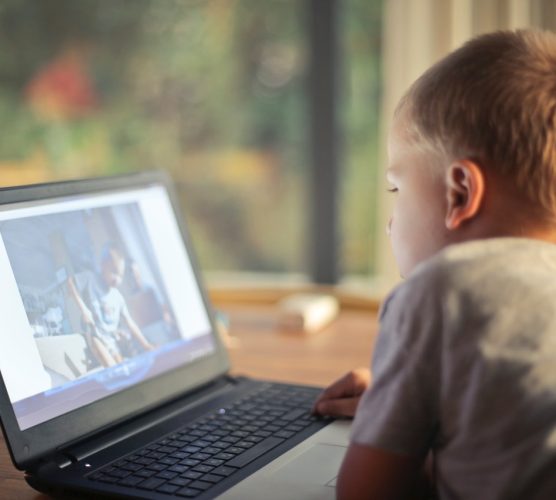Without a doubt, screen time – and just how much our kids should have of it – is one of the biggest worries modern parents face.
A child tapping frantically on a phone to get an animated character to jump from one platform to another, or watching a video of their favourite cartoon pig on an A5-sized screen were scenarios unimaginable as recently as 20 years ago. As such, our kids’ experiences are incredibly different from a lot of our own childhoods.
We should of course question new technology, but it’s worth mentioning that not all screen time is bad – they have allowed us to be closer and more productive than ever before – we get 84% more done in an hour in the workplace than we did 50 years ago because of new tech, according to the Centre for Economic and Business Research.
Even the Royal College of Paediatrics says that there is no evidence to support that screen time in itself is “toxic” to a child’s health.
But should that mean screen time is given free reign over our childrens’ lives or do we cut it out as much as possible? Is there ever simply a ‘right’ amount?
Why screen time should be limited
Studies show that excessive screen time leads to shorter sleep duration, particularly as a lot of screen time happens before bedtime. The World Health Organisation said earlier this year that children under five need significantly less screen time and more time for “active play”.
Quality time spent in interactive, non-screen-based activities with a caregiver, such as reading, storytelling, singing and puzzles, is also very important for child development.
What’s more, at Koru Kids we expect our nannies to keep their own screen time to a bare minimum – not only should their primary focus be your children, we want to make sure they engage with whatever activities your kids are getting up to.
For parents, the same limits should apply too. Experts at Indiana University have said that constantly checking our phones while playing with our kids has a negative impact on their attention spans, which has knock-on results for academic performance. Quite simply, sometimes, responding to that work email can wait.
How to limit screen time
A survey for children and young people revealed that across the week, they spend an average of 2.5 hours on a laptop, tablet or computer, 3 hours on their phone, and 2 hours watching TV a day – that’s nearly a third of a day spent interacting with a screen.
The big tech companies themselves have realised parents’ concerns – Playstation, Xbox and Nintendo have some form of screen time limit under their “Settings” to help parents to help control usage where necessary. This also goes for phones with the relatively new versions of Android and iOS.
A common but effective trick is to make sure the dining table becomes a phone-free zone. Studies show that children are healthier and do better academically when children eat together and talk over the dinner table.
Late-night usage is particularly bad because it has known effects on sleep. Not even using the device, and just having access to it by the bed means that they might be anticipating messages or the next upload from their favourite YouTuber, keeping them restless.
Blue light is particularly potent – it strongly interferes with the release of the hormone which controls sleep cycles. While some phones have a ‘blue light filter’ option, the best solution is actually to move phones and devices away from the bedside altogether.
Making sure they’re looking at the right stuff
A lot of schools will require online work or research that can quite easily slide into YouTube browsing. Many apps and add-ons for internet browsers such as BlockSite for Chrome, or parental settings on routers from the top internet providers are designed to help with this.
Unfortunately, there is also a lot of harmful content out there that you’d never want your kids to come across in the first place. Firewalls and add-ons can do much to keep out the majority, but there is a good chance that while browsing the web, your child may come across something inappropriate. As such, monitoring what they are viewing is vital – you can never rely on a firewall alone, so be ready to have tough but necessary conversations if they come across something inappropriately violent or sexual, for example.
As they get older, social media will most likely play a key part in their interaction with their friends and peers, and pose another avenue of inappropriate content. But while cutting out social media entirely is one way to prevent exposure to this, what’s most important is to have a discussion about the risks and dangers of these platforms beforehand, and to talk about things they have seen or have upset them. Sometimes this might be as simple as reminding them that life doesn’t revolve around the number of likes on an Instagram post.
Children will often be reluctant to start these conversations, so you will probably need to take the lead. Remember, making sure you’re there to talk is vital.
Embracing screen time?
While much has been touted about the future of ‘screenless’ technology, we are still a few years away from everybody simply viewing content projected directly onto their retinas. And while everyone is glad of the screen babysitter from time to time, there are real benefits to watching or interacting with the same content your children are.
A study from the University of Oxford found that parents who reported playing video games with their children are about three times more likely to accurately assess the benefits and risks that gaming has on young people as compared with adults who are not parents and those who have never played.
Furthermore, there are a load of great educational sites, tools and apps for children as well (though we all know many, given a chance, will log on and head straight to Fortnite, YouTube, or Tiktok).
So how much is too much?
It would be all too easy to say that precisely 73 minutes and 48 seconds is the right amount of time for our kids to be sat in front of a screen each day.
While there isn’t a universally-accepted recommendation, psychologists generally agree that it’s when it comes at the expense of more important things such as sleep, keeping active, homework and helping around the house.
And one more thing – if you’re planning on cracking down on your children’s screen time, you might do well to assess your own first. After all, nothing says ‘the rules are there are to be broken’ as a parent that can’t keep their own screen time under control!
Koru Kids has after school nannies in your local area



